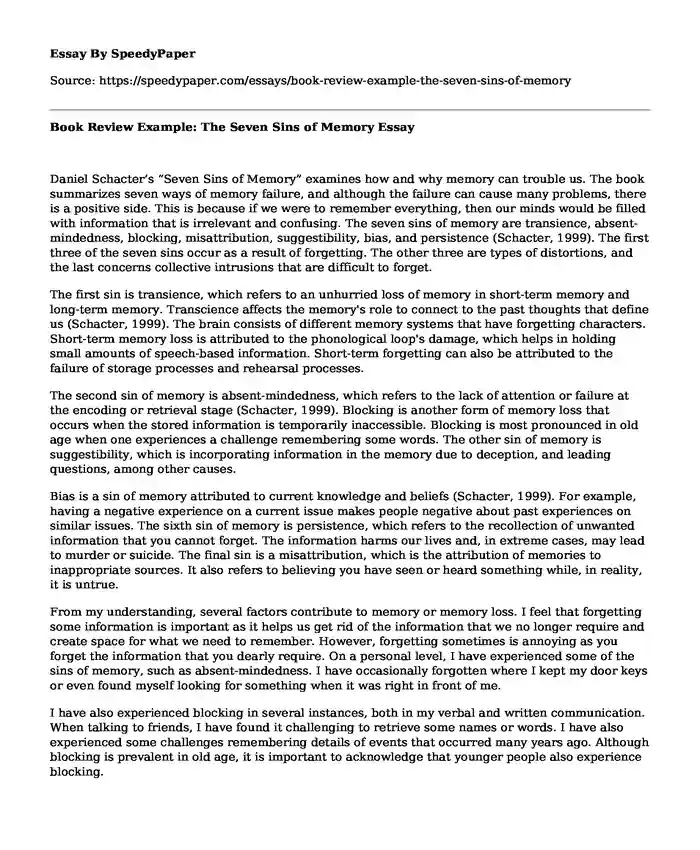
| Essay type: | Book review |
| Categories: | Psychology Literature American literature Books |
| Pages: | 3 |
| Wordcount: | 622 words |
Daniel Schacter’s “Seven Sins of Memory” examines how and why memory can trouble us. The book summarizes seven ways of memory failure, and although the failure can cause many problems, there is a positive side. This is because if we were to remember everything, then our minds would be filled with information that is irrelevant and confusing. The seven sins of memory are transience, absent-mindedness, blocking, misattribution, suggestibility, bias, and persistence (Schacter, 1999). The first three of the seven sins occur as a result of forgetting. The other three are types of distortions, and the last concerns collective intrusions that are difficult to forget.
The first sin is transience, which refers to an unhurried loss of memory in short-term memory and long-term memory. Transcience affects the memory's role to connect to the past thoughts that define us (Schacter, 1999). The brain consists of different memory systems that have forgetting characters. Short-term memory loss is attributed to the phonological loop's damage, which helps in holding small amounts of speech-based information. Short-term forgetting can also be attributed to the failure of storage processes and rehearsal processes.
The second sin of memory is absent-mindedness, which refers to the lack of attention or failure at the encoding or retrieval stage (Schacter, 1999). Blocking is another form of memory loss that occurs when the stored information is temporarily inaccessible. Blocking is most pronounced in old age when one experiences a challenge remembering some words. The other sin of memory is suggestibility, which is incorporating information in the memory due to deception, and leading questions, among other causes.
Bias is a sin of memory attributed to current knowledge and beliefs (Schacter, 1999). For example, having a negative experience on a current issue makes people negative about past experiences on similar issues. The sixth sin of memory is persistence, which refers to the recollection of unwanted information that you cannot forget. The information harms our lives and, in extreme cases, may lead to murder or suicide. The final sin is a misattribution, which is the attribution of memories to inappropriate sources. It also refers to believing you have seen or heard something while, in reality, it is untrue.
From my understanding, several factors contribute to memory or memory loss. I feel that forgetting some information is important as it helps us get rid of the information that we no longer require and create space for what we need to remember. However, forgetting sometimes is annoying as you forget the information that you dearly require. On a personal level, I have experienced some of the sins of memory, such as absent-mindedness. I have occasionally forgotten where I kept my door keys or even found myself looking for something when it was right in front of me.
I have also experienced blocking in several instances, both in my verbal and written communication. When talking to friends, I have found it challenging to retrieve some names or words. I have also experienced some challenges remembering details of events that occurred many years ago. Although blocking is prevalent in old age, it is important to acknowledge that younger people also experience blocking.
While sins of memory, such as blocking, are witnessed in younger people, I agree that they are more pronounced in old age. For example, older adults experience challenges retrieving proper names compared to younger people (Schacter, 1999). As people age, changes not only occur in other parts of the body but also take place in the brain. Therefore, as people age, they forget where they have kept their items or even realize that they cannot completely remember some information.
References
Schacter, D. (1999). The Seven Sins of Memory: Insights from Psychology and Cognitive Neuroscience. Scholar.harvard.edu. Retrieved 10 September 2020, from https://scholar.harvard.edu/files/schacterlab/files/schacter_american_psychologist_1999.pdf.
Cite this page
Book Review Example: The Seven Sins of Memory. (2023, Dec 08). Retrieved from https://speedypaper.net/essays/book-review-example-the-seven-sins-of-memory
Request Removal
If you are the original author of this essay and no longer wish to have it published on the SpeedyPaper website, please click below to request its removal:
- Free Paper Sample with a Stress Lab Report
- Free Essay Sample on How to Survive a Breakup
- Reflective Essay Sample: Team Management
- Essay Example on Development with Diversity
- Free Essay: The Glass Menagerie by Tennessee Williams
- Essay Sample: Theme of Resurrection in A Tale of Two Cities by Charles Dickens
- Theories of Development. Paper Example
Popular categories




